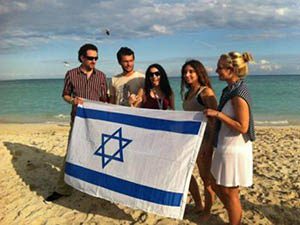Original post can be found on the Times of Israel blog
The Adam and Gila Milstein Family Foundation proudly supports AIPAC’s Campus Allies Mission, which enables non-Jewish, pro-Israel political activists and student leaders to visit Israel for the first time. This journey to the Holy Land gives participants an unforgettable experience and teaches them about the importance of the United States-Israel relationship, and Israel’s strategic, social, and security issues. Participant Deryn Sousa shares how the Mission brought three separate strands of her life into harmony. You can read her post below.
I have always been pro-Israel. As a child, I was interested in the “Holy Land,” rather than the State. In college I began to take a particular interest in the Israel issue as it pertained to Arabs. While maintaining my own Christian faith along with my pro-Israel activism, I began to study Arabic and immerse myself in Arab and Muslim student clubs. The idea of all three entities truly living side-by-side was completely unrealistic in my eyes and in the eyes of many. This view became completely altered once I visited the “Holy Land.”
I recall floating carelessly in the Dead Sea, how I was at a loss for words as we drove through the countryside in Jeeps, how much I enjoyed soaking in all of the history of a land so precious to so many people, or even how I developed beautiful lasting relationships. However, the greatest takeaway from this amazing journey is simply the revelation that Israel makes this relationship between my faith, my views, and my education work.
Throughout the first couple of days we ‘hit the ground running.’ We explored an overwhelming amount of historical sites, taking in the immense history of this land. Yet it was not until about halfway through the trip that I truly began to see the meaningfulness and holiness of the sacred land of Israel. This Israel is a sacred home to a people of immigrants. This Israel, under the layers of tourism, history, and religious significance, at its truest and rawest form, is a country that takes so many different people amidst so much violence and controversy, and still makes the paradox work.
At the dead center of our ten-day trip, I experienced a day of terrible sadness, yet beautiful hope. Walking through Yad Vashem, we remembered and mourned the lives of those lost to anti-Semitic genocide. We all were presented with a whirlwind of emotions that I was not prepared for and found difficult to process. Standing in the Children’s Memorial brought tears I had not experienced in a long time. Before I made it to that particular memorial, however, I had picked up a phone at one of the museum’s exhibits, only to hear a man singing mournfully in Yiddish. I was not expecting to be hit by such sadness, yet I could not help but feel a knot in my stomach as I never wanted to hang up on him.
While that morning was characterized by the sorrow of the haunting memories at Yad Vashem, that afternoon would bring about the peace and beauty of Israel. As a Christian, the Garden Tomb truly meant something special to me. Aside from my own religious ties, this was where I truly felt my own personal tie to Israel for the first time. This was the defining moment where I finally found the answer to the ambiguous question about my “own personal connection to the State of Israel.”
I was sitting in the Jewish homeland, at the Christian site of Jesus’ burial, with the faint sound of the Muslim call to prayer in the background. My three worlds came together at this exact moment: my Christian faith, my pro-Israel work for the Jewish cause, and my passion for my Arabic studies. In that moment, all three religions coexisted.
In Israel there is never truly peace. Threats of terrorism are everywhere and tensions do exist, but Israel still makes it work. The people are making it work – living side-by-side, ensuring that another Yad Vashem will never need to be built again. Not for Jews, not for Christians, and not for Arabs.
I am truly blessed to have been given the opportunity to experience the miracle of Israel, and develop my own personal connection to it.
—
To learn more about the philanthropic work of Adam Milstein and the Milstein Family Foundation, visit http://milsteinff.org. Also – check out Adam Milstein and the Milstein Family Foundation on Facebook!

